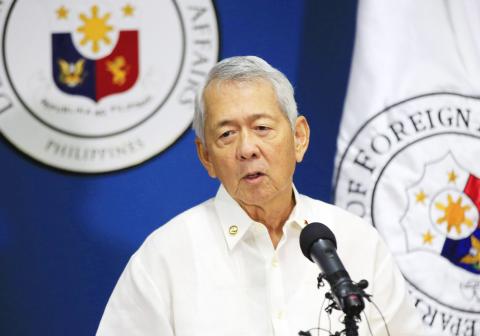Manila has rejected Beijing’s demand that it “disregard” an international ruling that invalidated China’s claims to much of the South China Sea before negotiating on the issue, Philippine Secretary of Foreign Affairs Perfecto Yasay said yesterday.
China last week denounced The Hague-based Permanent Court of Arbitration’s finding that there was no legal basis for its claims to most of the strategic, resource-rich waters, provoking stern warnings from leaders from Japan to the EU that it must respect the rule-based global order.
Following the decision, Beijing asked Manila, which brought the case, “to open ourselves for bilateral negotiations, but outside of and in disregard of the arbitral ruling,” Yasay told broadcaster ABS-CBN.

Photo: EPA
“This is something that I told him was not consistent with our constitution and our national interest,” he said.
The court ruled that Beijing had violated the Philippines’ sovereign rights to exploit resources in waters up to 340km beyond its coast, called its exclusive economic zone.
Yasay’s comments were more forceful than previous reactions from Manila, with Philippine President Rodrigo Duterte keen to restore relations with Beijing and promising not to “taunt or flaunt” the verdict.
Yasay and his Chinese counterpart, Wang Yi (王毅), discussed the possibility of talks on the sidelines of an Asia-Europe summit in Ulan Bator last weekend, but made no headway, Yasay said.
He quoted Wang as telling him: “If you will insist on the ruling, discussing along those lines, then we might be headed for a confrontation.”
Direct talks were unlikely soon in the light of Beijing’s refusal to accept the ruling, Yasay said.
“Let the dust settle some more and let’s see how we can open up the road for this kind of negotiation,” he added.
In related news, Chinese Vice Minister of Commerce Gao Yan (高燕) yesterday in Beijing brushed off calls from some Chinese for a boycott on products from the Philippines and the US because of the ruling.
Asked if China would take retaliatory trade measures against Manila, Gao told reporters that trade relations with Manila were developing smoothly.
“In recent years, the development of China’s trade relations with the Philippines overall has been smooth and stable. China is willing to develop mutually beneficial and diverse trade relations with the Philippines,” she said.
“I should say that though some Internet users have called for boycotts on products from the Philippines, in actuality this situation has not occurred,” she said.
State media has called on people to oppose “irrational patriotism” over the case.
“Other net users have levelled false accusations against public figures and have started to mislead people into blindly boycotting foreign products and brands such as Philippine bananas, iPhones and KFC,” the state-run tabloid the Global Times said.

Seventy percent of middle and elementary schools now conduct English classes entirely in English, the Ministry of Education said, as it encourages schools nationwide to adopt this practice Minister of Education (MOE) Cheng Ying-yao (鄭英耀) is scheduled to present a report on the government’s bilingual education policy to the Legislative Yuan’s Education and Culture Committee today. The report would outline strategies aimed at expanding access to education, reducing regional disparities and improving talent cultivation. Implementation of bilingual education policies has varied across local governments, occasionally drawing public criticism. For example, some schools have required teachers of non-English subjects to pass English proficiency

‘FORM OF PROTEST’: The German Institute Taipei said it was ‘shocked’ to see Nazi symbolism used in connection with political aims as it condemned the incident Sung Chien-liang (宋建樑), who led efforts to recall Democratic Progressive Party (DPP) Legislator Lee Kun-cheng (李坤城), was released on bail of NT$80,000 yesterday amid an outcry over a Nazi armband he wore to questioning the night before. Sung arrived at the New Taipei City District Prosecutors’ Office for questioning in a recall petition forgery case on Tuesday night wearing a red armband bearing a swastika, carrying a copy of Adolf Hitler’s Mein Kampf and giving a Nazi salute. Sung left the building at 1:15am without the armband and apparently covering the book with a coat. This is a serious international scandal and Chinese

TRADE: The premier pledged safeguards on ‘Made in Taiwan’ labeling, anti-dumping measures and stricter export controls to strengthen its position in trade talks Products labeled “made in Taiwan” must be genuinely made in Taiwan, Premier Cho Jung-tai (卓榮泰) said yesterday, vowing to enforce strict safeguards against “origin laundering” and initiate anti-dumping investigations to prevent China dumping its products in Taiwan. Cho made the remarks in a discussion session with representatives from industries in Kaohsiung. In response to the US government’s recent announcement of “reciprocal” tariffs on its trading partners, President William Lai (賴清德) and Cho last week began a series of consultations with industry leaders nationwide to gather feedback and address concerns. Taiwanese and US officials held a videoconference on Friday evening to discuss the

PERSONAL DATA: The implicated KMT members allegedly compiled their petitions by copying names from party lists without the consent of the people concerned Judicial authorities searched six locations yesterday and questioned six people, including one elderly Chinese Nationalist Party (KMT) member and five KMT Youth League associates, about alleged signature forgery and fraud relating to their recall efforts against two Democratic Progressive Party (DPP) legislators. After launching a probe into alleged signature forgery and related fraud in the KMT’s recall effort, prosecutors received a number of complaints, including about one petition that had 1,748 signatures of voters whose family members said they had already passed away, and also voters who said they did not approve the use of their name, Taipei Deputy Chief Prosecutor